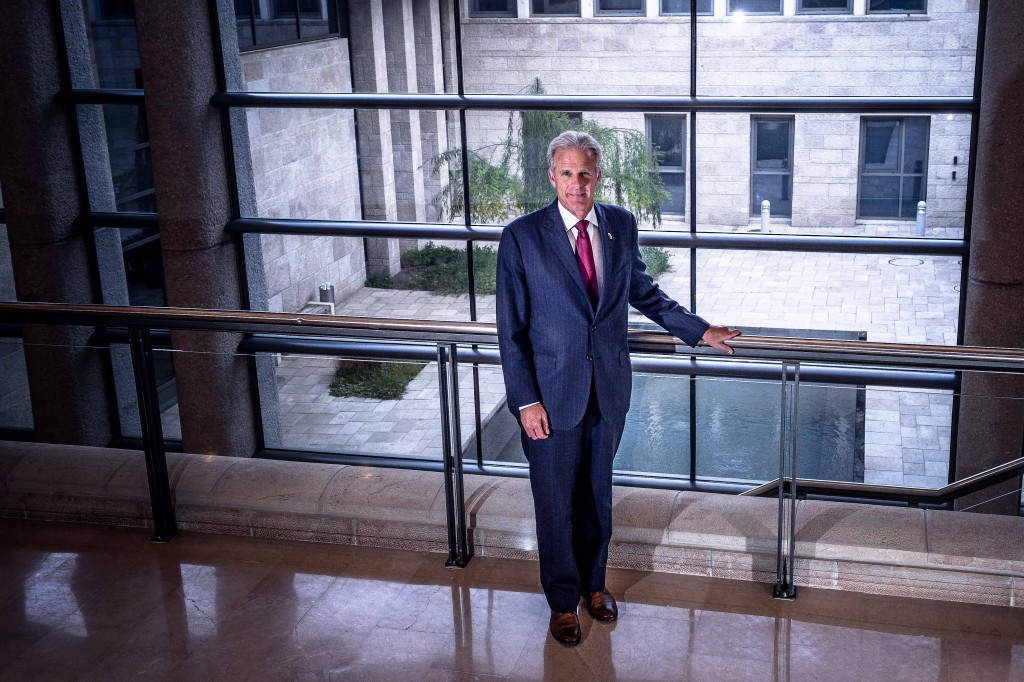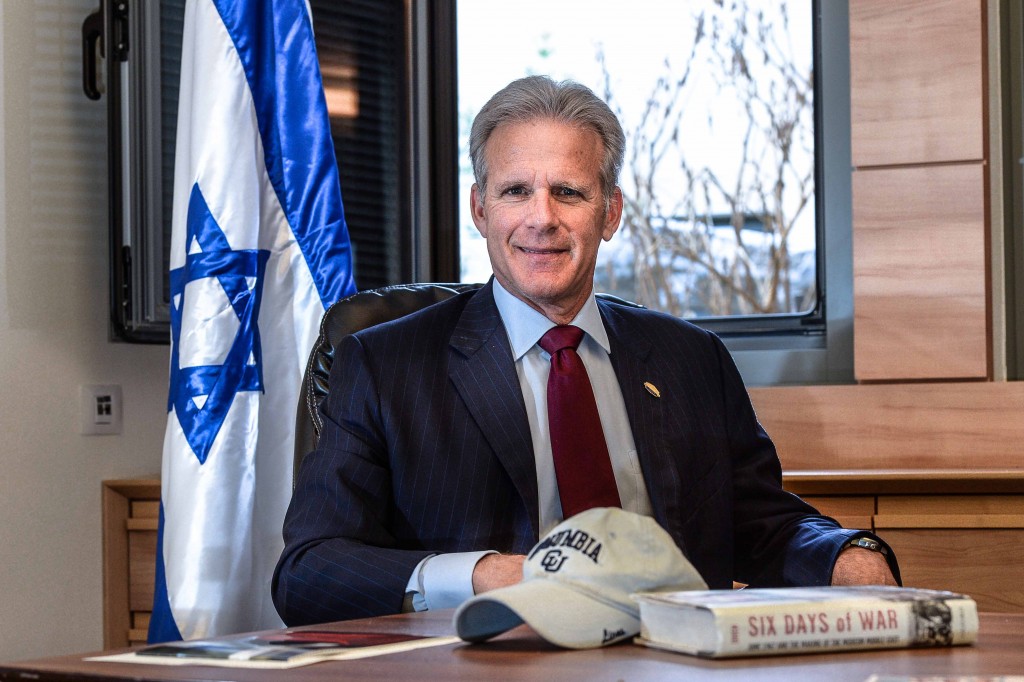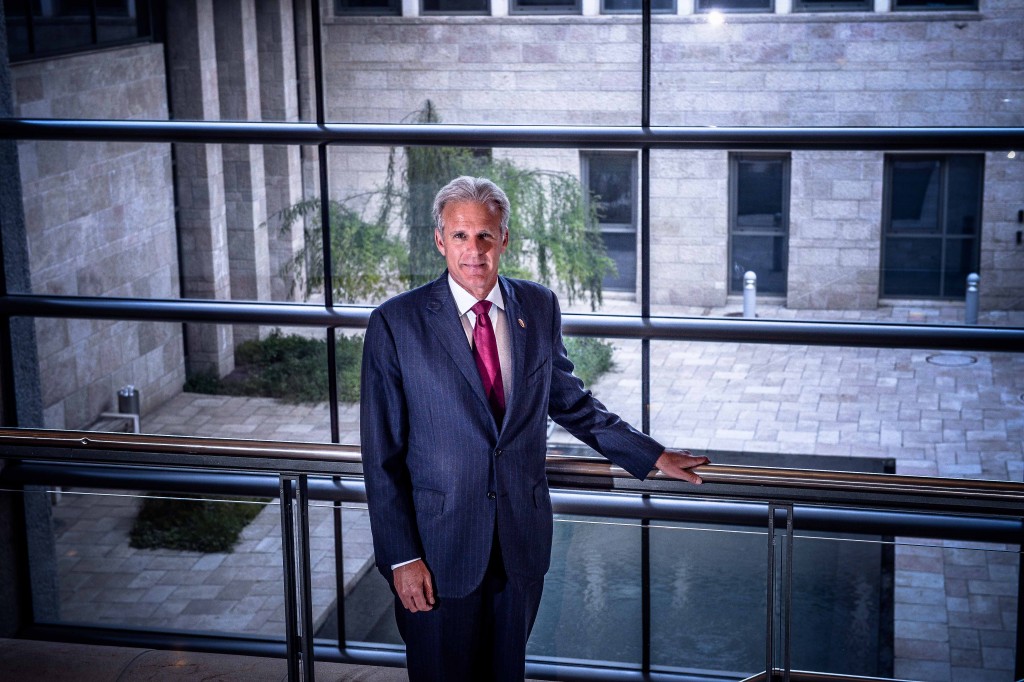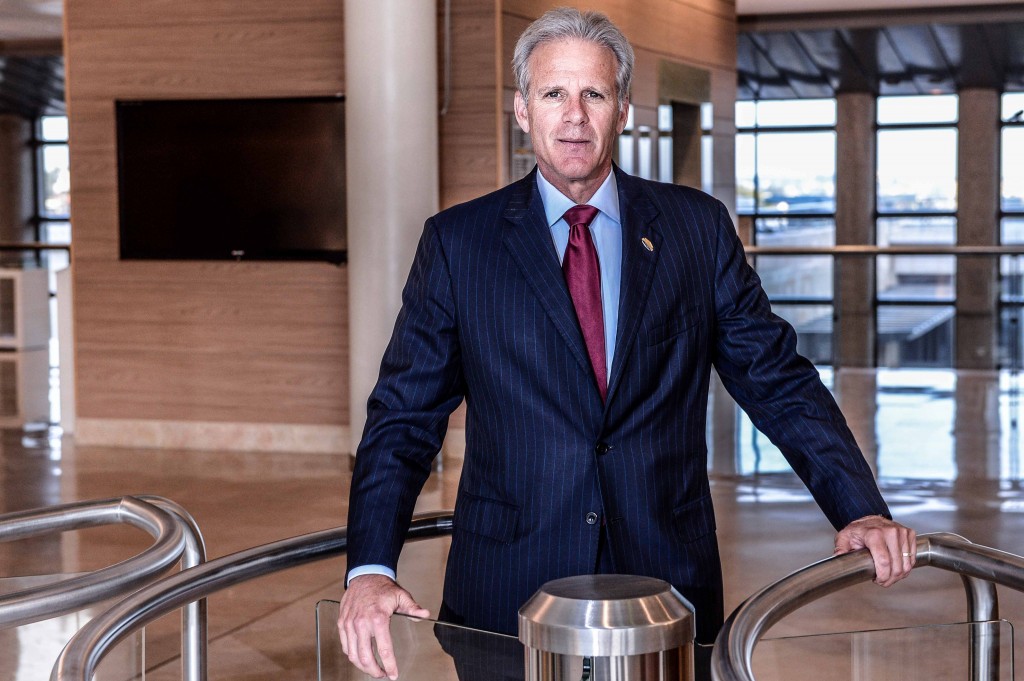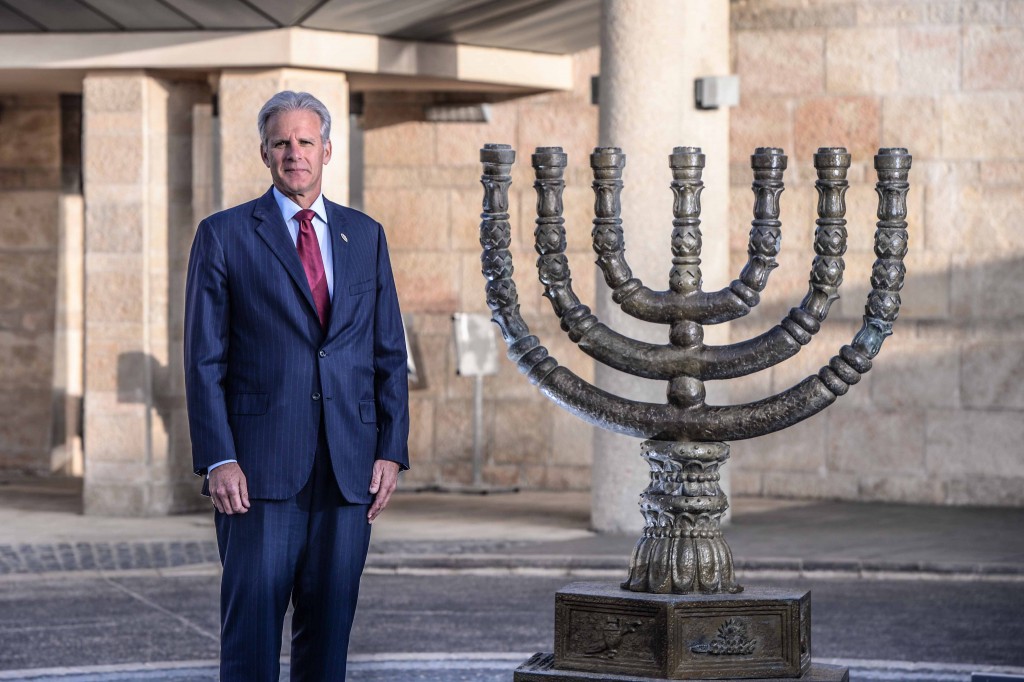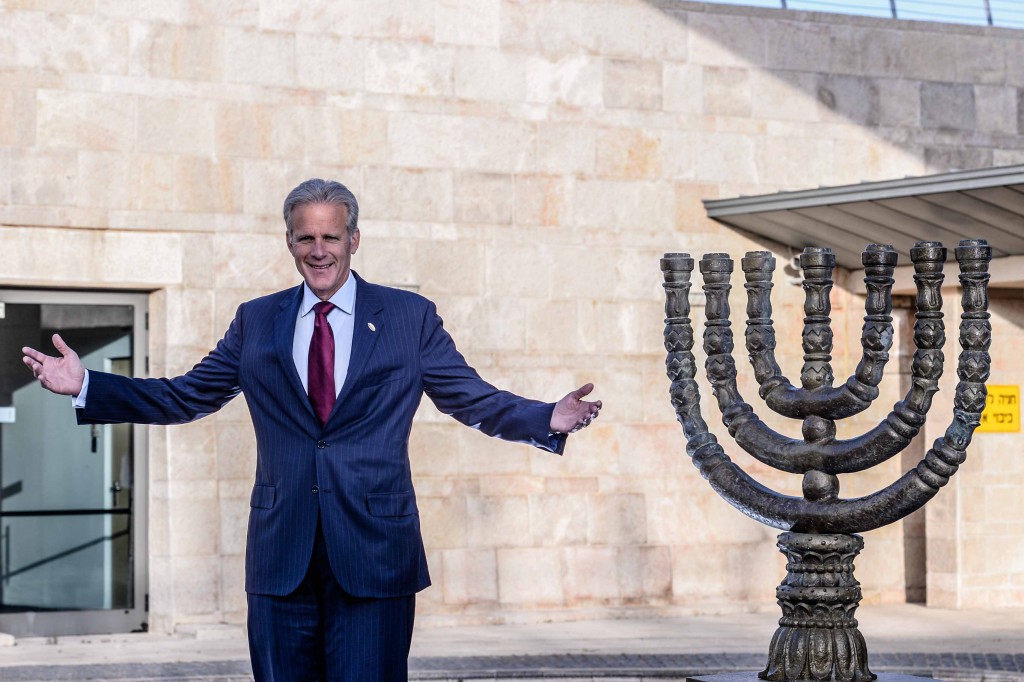Best-selling historian, top-ranking diplomat—and now fledgling politician. As Michael Oren’s career enters a new phase, he shares his views on peace, extremism, and his own place in history.
“He was an extremely unpleasant person,” Michael Oren says of Orson Welles near the end of our conversation. As a youthful gopher for the legendary filmmaker, he tells me, “I was in charge of clipping his cigars, wiping the sweat from his forehead, helping him on and off with his cape, and doing various sundry things for which I got paid an inordinate amount of money.”
So bizarre does it seem to be only one degree of separation from the man who made Citizen Kane that it suddenly feels entirely normal to be zero degrees of separation from Israel’s former ambassador to the United States and newly elected Member of Knesset. And it certainly doesn’t hurt that, although we haven’t spoken in almost a decade, I’ve known Michael Oren for quite a while. We met when I worked as an editor at a think tank in Jerusalem, and I still remember the farewell party given before he took office as ambassador.
I haven’t seen him since then, but surprisingly, he seems to remember me as well as I remember him. At the beginning of our conversation, I mention that I ran into him in Jerusalem’s German Colony a few days after his appointment was announced and asked if he was enjoying the last moments of his anonymity. He responds with a knowing and rueful laugh, one I am to hear again and again over the course of our interview. There was also the time he gave me a ride home from a conference, during which we had a lengthy conversation that included tales of his army service, such as his memories of the battle for Beirut in 1982. The one thing wrong with war movies, he told me, is that they cannot capture the smell of combat.
As we converse, it quickly becomes obvious that Oren hasn’t changed all that much, if at all. Indeed, unlike most people who have served in high political or diplomatic office, he is remarkably self-effacing, modest, down to earth, and, perhaps above all, mordantly funny. At the same time, he has retained one his most striking qualities: A certain sense of integrity. A sincerity marked by a desire to transcend the clichés of political discourse and find, somehow, a middle way between opposing camps.
Indeed, it quickly becomes clear that being a man of the Center is of deep importance to Oren. He is, as Al Gore once called himself, “a raving moderate.” This is borne out by his membership in Kulanu, a new Centrist party that stated its willingness to sit in a government led by the Left or the Right, and is new part of the governing coalition. And it appears to reflect something essential in Oren’s personality. In fact, over the entire course of our interview, Orson Welles is one of the few topics on which he is neither circumspect nor ambivalent.
This tendency toward the Center, toward the way between extremes, is something Oren appears to have been born into. His long strange trip from aliyah to the intellectual confines of the historian to diplomacy to the blood sport that is Israeli politics began in New Jersey in 1955, where Oren was born into a Conservative Jewish family. He moved to Israel in the 1970s, served in the army during the aforementioned First Lebanon War, and eventually became a universally respected historian with his book Six Days of War. A history of Israel’s 1967 Six-Day War, the book is now considered the definitive account of the conflict, even in many Arab countries. Then Oren was suddenly plucked out of the rarified world of the scholar and thrust into the maelstrom of world politics, serving as Israel’s ambassador to the United States from 2009-2013, some of the most turbulent years of the U.S.-Israel relationship.
But it was the fact that he was born into a Conservative Jewish household that instantly caught my eye. Is this, I ask him, a legacy he has carried all his life? Just as Conservative Judaism tries to hew a middle way between its Reform and Orthodox counterparts, hasn’t he done the same in regard to Israeli and Arab views of the Six-Day War, the ideologies of Israel’s Left and Right, and the need to maintain Israel’s relationship with the U.S. despite the inevitable disagreements between both parties? Hasn’t he always, to one degree or another, taken the middle way?
Oren chooses his words carefully when he responds, calling it a “very interesting perspective. I’ve never really thought about that.” At first, he demurs, noting that his decision to make aliyah at a time when “Israel was sort of the Wild West was hardly middle of the road.” Equally important to him is the fact that he came alone. “I don’t have any family here other than the family that I built, the family I created,” he says. “So that was pretty radical.”
Nonetheless, he freely admits that “my politics have always been very moderate, they’ve been middle of the road.” He also notes that to be “middle of the road” is hardly a vice. Ever the intellectual, he references the ancient philosopher Aristotle’s “Golden Mean, which is what I think we should strive for.” At the same time, however, he is aware of the Achilles’ heel of the Centrist: By rejecting both sides, he often finds himself rejected in return. “It depends on whose perspective,” he notes. “From the perspective of campus radicals, I’m a screaming Rightist. From the perspective of some people on the hilltops in Judea and Samaria, I’m a screaming Leftist.”
But Oren acknowledges that this dedicated Centrism is deeply important to him. “I have striven for moderation,” he admits. “I see myself as a Centrist politically.” Moderation, he asserts, is “what I try to do in my politics and certainly in my diplomacy.”
This tendency appeared even in regard to one of the most controversial questions of the last several months: Prime Minister Benjamin Netanyahu’s speech to Congress and the resulting crisis in his relationship with President Barack Obama; a crisis that has only intensified since Netanyahu’s reelection. Before the speech took place, Oren stirred some controversy of his own by criticizing Netanyahu’s decision to go ahead with the address despite White House opposition. “I thought I could have achieved a very similar goal elsewhere,” he tells me, “and I’ve been very upfront about that.” But he quickly moves on to other, more practical considerations. “We’re going to have to think about how we begin—to the degree that we can—to rectify the damage,” he says. “Everyone admits there has been damage. I think on both the Israeli and the American side, we’ve talked about damage. I don’t know how deep that damage is going to go.”
As he begins to speak about this, it almost seems as if Oren is thinking things through as he goes along, striving to bring a certain rationalism to bear on a deeply emotional issue. “I think that one of the ways that we can begin to rectify the damage is by being proactive on the diplomatic front,” he says, meaning that Israel should reach out to the “disaffected side,” such as “the progressive wing of the Democratic party,” which has “a very deep feeling about the Palestinian issue, and I think we have to respond to it. I think that by being flexible on the Palestinian issue, we will be able to be more adamant in opposition on the Iranian issue.”
Thus, Oren quietly segues from one deeply controversial issue to another—namely, the loaded question of the Iranian nuclear program and an upcoming deal that the Israeli government bitterly opposes. Oren, however, does not see the question as “loaded,” but rather “multifaceted.” He notes that “I participated in all of our intimate discussions with the United States on the Iranian issue,” which he does indeed see as a “looming existential threat.” Indeed, he goes as far back as his work with the late Prime Minister Yitzhak Rabin in the 1990s, saying that Rabin “told us the reason he was pursuing peace with the Palestinians was the Iranian existential threat. … In that way, I couldn’t agree more with the prime minister’s position. I don’t think there’s much debate here about it.” Yet almost instantly, the circumspect mind returns, as he says, “The question is, what do we do about it?”
At the end of the day, we don’t know if the Iranians are going to sign [President Obama’s framework deal] or not, but whether they do or whether they don’t, our relationship with the United States is going to be crucial.…If they do sign, then we’re dealing with a deal that we consider a very bad deal and we’ll have to think about ways we can defend ourselves.
When I ask if this could mean an Israeli military strike, Oren instantly demurs, as do almost all Israeli politicians, saying, “Obviously, I’m not going to respond to that.” But then, like most Israeli politicians, he notes, “Israel reserves the right and the duty to defend itself against any threat. That is a right that has been repeatedly recognized by President Obama. So, no one is gainsaying that right.”
At the same time, Oren sees the Iran issue as deeply connected to the issue of the peace process, which most Israeli politicians do not. As opposed to Prime Minister Netanyahu, he strongly believes that Israel has not done enough to further the peace process, and this has had serious repercussions for the Jewish state. “You look across the spectrum,” of Israeli politics, he says, and “nobody’s addressing this policy and this situation realistically.”
“I’m trying to disabuse myself and anyone around me of any illusions,” he asserts. And he believes that the illusions are everywhere. The Left, he says, is “waiting for Mahmoud Abbas to come back to the negotiating table,” hoping for a situation in which “you have leaders sit around a table and they sign a piece of paper.” But this is impossible, because “on the piece of paper are concessions which neither side can ever make, at least not for the foreseeable future.”
The Palestinians, he says, are demanding that Israel “go back to the 1967 borders, redivide Jerusalem, basically give up on Har Ha’Bayit [the Temple Mount], take immense, immense risks in terms of the Jordan Valley and our security.” At the same time, Israel is now “asking the Palestinians to give up on Haifa and Jaffa, give up on the return of five million refugees, declare an end of claims, end of conflict,” which Oren views as essential to Palestinian identity. As a result, “These conditions are, certainly under current circumstances, impossible to concede.” Up to now, he says with a historian’s eye, the peace process is one in which “We keep on getting disappointed. That’s why we’ve been at this process for 22 years, and even in times when we think we’re getting close, like in 2000, 2008, the Palestinians run away. I’m the person least surprised by it.”
Most Israelis probably feel the same way. Certainly, Prime Minister Netanyahu does. But where Oren differs from most is that he believes the question is, What do we do about it?
To Oren, the answer lies in what he calls a “litmus test.” Israel’s question should be “What strengthens us?” Citing a recent Wall Street Journal article he wrote—“a summation of about 40 years thinking about this,” as he calls it—he once again tries to hew a middle way between the opposing camps. “What we see,” he says, “is not a two-state solution but a two-state situation,” in which “90 percent of the Palestinians are conducting their own affairs. The IDF is not in the major cities, it’s not in the towns, and the Palestinians enjoy a significant degree of sovereignty” with “extensive areas of cooperation; whether it’s in energy, security, particularly international trade.” Unlike the Right, he sees this as “a reality that provides a basis for creating the conditions on which maybe, maybe some peace may grow, but we should work to strengthen that reality in ways that strengthen us.”
On this “litmus test,” however, Oren’s position has changed. For much of his public career, Oren has advocated some form of unilateral withdrawal from the West Bank, echoing the 2006 disengagement from Gaza. But now, the man who once called himself “the last unilateralist” has left this controversial option by the wayside. His recommendations for furthering the peace process involve no withdrawal of Israeli security forces or settlements. “There’s no withdrawal now,” he says, “we’re not at that stage. You don’t uproot any settlements, you’re not going to redivide Jerusalem. Not even remotely.” And the IDF will maintain security control over much of the West Bank. “The army stays where it is. We maintain our prerogatives, which include control of airspace, and the right of hot pursuit.” This final issue “is very important,” he says. In fact, it once saved PA President Mahmoud Abbas’s life. “Keep in mind,” he says, that Abbas “wouldn’t be alive today if we didn’t have the right of hot pursuit. [Hamas] tried to kill him last summer. We stopped them. Because we had the right of hot pursuit.”
But Oren has not spun to the Right either. The current government, he asserts, “over the last couple of years has adopted a policy of doing nothing. I actually heard them say as much on a panel: ‘Our policy is to do nothing.’” Given the extremely unstable state of the region at this time—something Netanyahu pointed out to much controversy in the last days of the election campaign—Oren sees this as somewhat understandable, “but the problem is the status quo is untenable in terms of world opinion. We have to do something to change the status quo. Maintaining the status quo is not an option. It’s not a realistic choice.”
The other leading parties, he believes, are no more realistic. Yair Lapid’s Yesh Atid party has called for a regional conference with the Arab states. Oren dismisses the idea with the comment, “That worked really well at Madrid,” a reference to the 1991 regional conference during which, completely outnumbered by the Arab states, Israel took a considerable beating. Naftali Bennett’s Jewish Home party, however, doesn’t fare much better. Bennett, Oren says, is “the least realistic” of all Israel’s leaders, “because he says he’s going to annex 60 percent of the West Bank, which is an immediate economic boycott, sanctions; we’ll lose not just the Democratic party, we’ll lose the Republican party, and we’ll lose America.” Faced with such options, then, what is Israel to do? The status quo is unsustainable, but no one seems to have any better ideas.
Changing the status quo, Oren says, involves “three tests.” The first is “to prove to the world that we have no desire to rule over the Palestinians, and that we’re going to make positive and concrete efforts to show that.” The second is to make it clear that “We will always keep the door open to final status negotiations, should a Palestinian leader appear. I don’t think one’s about to appear, but you don’t know what’s going to happen in the coming years.” The final test relates to the deeply controversial issue of the West Bank settlements. But here again, Oren proves to be in favor of a middle way. He calls this issue “the hard one,” and his plan involves Israel acting “in accordance with the Bush-Sharon understanding of 2004, which was approved by both houses of Congress and has a special standing. And that is we will build in the settlement blocs and in Jewish Jerusalem.” In other words, only in areas “which will be part of the State of Israel in any final status agreement.”
This, he says, “is what we can do realistically today. We can’t manufacture a Palestinian leadership. We can’t manufacture a regional leadership. We can’t withdraw from the West Bank. We can’t annex the West Bank. What are your alternatives here?” And he believes quite strongly that his answer to the question will improve Israel’s strained relations with the White House. “Anybody you sit with in Washington and explain this to them,” he asserts, “will understand it.”
Oren, like most politicians, has little time to spare, so I get to what he calls “the heart of the matter.” Oren is, after all, a historian, and noting that he was in Israel’s top diplomatic post during a moment of extraordinary upheaval in the U.S.-Israel alliance, the Middle East, and, in many ways, the world, I ask him how he thinks future historians will write the history of this period.
“I often ask myself that question,” he replies. “You can scarcely imagine how frequently I ask myself that question. And I think my fear is that we will look back at this period as transformational, and not in a positive way; that future generations will scratch their heads and wonder about some of the decisions that were made.” Citing historian Barbara Tuchman’s concept of the “March of Folly” that sparked World War I and numerous other historical catastrophes, he remarks, “I fear we’ll look back on this as a promenade of folly”; one that took place at a pivotal moment not only for Israel, but the world. “I’m quite convinced that we could be on the cusp of the nuclearization of the Middle East,” he says, “Which would change not only Israel’s reality, it could change human reality.”
And historians may look back on this a hundred years from now and wonder why people weren’t more clear-sighted. Here’s an example: Not calling radical Islam “radical Islam” could be one of the items mentioned by historians saying, “Why didn’t they call it what it was?” You could say it about Israel. “Why didn’t Israelis take more initiative in their hands and do something about their diplomatic situation regarding the Palestinians and others?”
Ever rueful, he remarks, “I don’t know if that’s helpful.”
“It is,” I reply. “Not necessarily uplifting, but it’s helpful.”
The one question he does not address, of course, is how historians will view Michael Oren himself. There is no doubt that he will receive more than a footnote in future chronicles of our era. The post of ambassador to the United States is always an essential one for Israel, and has been held by men who later became figures much contemplated by succeeding generations, including Yitzhak Rabin himself. And given that Oren is likely to hold a ministerial position in the next Israeli government, there may be a much more formidable legacy for historians to ponder.
At best, one can only make an educated guess about the future, but if Oren’s past is any indication, historians will likely view him as, more than anything else, the man in the middle; a figure whose desire for moderation sometimes brought him much success, but also much frustration. In trying to hew to the middle way, to Aristotle’s Golden Mean, he has sometimes pleased almost everyone, as in the case of Six Days of War, but just as often, as in his current views on the peace process and the controversy over Netanyahu’s speech, he has pleased almost no one.
But perhaps most importantly, I cannot help but come away from our conversation with the sense that Oren really means it. Some politicians hew to the Center for pragmatic reasons, others for the sake of mere rhetoric; but in the case of Oren, the aforementioned sense of integrity is unmistakable. To him, an extremist Israel is an Israel that is a danger to itself, and his politics and diplomacy have been remarkably consistent in their attempt to ensure that the Jewish state does not move too far, and too dangerously, toward one side or the other. To be the man in the middle is often a lonely fate, but one feels, in the end, that Oren has little choice in the matter. He is who he is, and he remains so even in the glare of the cameras and the chaos of Israeli politics. That alone may be enough to ensure a charitable verdict from the historians of the future.
What is certain, however, is that Oren will not be forgotten. Indeed, as we end our conversation, he remarks of his strange meeting with Orson Welles, “Most of my experience with him was being afraid that he would yell at me.”
“Well,” I say, by way of consolation, “that’s a place in history right there.”
![]()
Banner Photo: Aviram Valdman / The Tower






